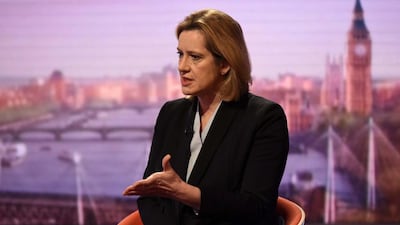London // British security services must have access to encrypted messaging applications such as WhatsApp, which was used by the Westminster attacker, the government on Sunday.
Khalid Masood, the 52-year-old Briton who killed four people before being shot dead in a rampage outside parliament on Wednesday, sent a message on WhatsApp that security services could not access, home secretary Amber Rudd said.
Ms Rudd said it was “completely unacceptable” that police and security services had not been able to crack the heavily encrypted service, which is owned by Facebook.
“You can’t have a situation where you have terrorists talking to each other – where this terrorist sent a WhatsApp message – and it can’t be accessed,” she told Sky News.
Police say Masood acted alone but they are trying to pinpoint his motive and identify any possible accomplices, making the WhatsApp message a potential clue to his state of mind and his social media contacts.
London’s Metropolitan Police said on Sunday that a 30-year-old man was arrested in the central city of Birmingham, where Masood had been living, on suspicion of preparation of terrorist acts. A 58-year-old man arrested in Birmingham remains in custody out of 11 people detained soon after the attack, while a 32-year-old woman has been released on bail.
Ms Rudd said attacks like Masood’s would be easier to prevent if authorities could penetrate encrypted services after obtaining a warrant similar to the ones used to listen in on telephone calls.
Without a change in the system, she said terrorists would be able to communicate with each other without fear of being overheard even in cases where a legal warrant has been obtained.
“There should be no place for terrorists to hide,” Ms Rudd said in a separate interview with the BBC.
“We need to make sure that organisations like WhatsApp – and there are plenty of others like that – don’t provide a secret place for terrorists to communicate with each other.”
She said end-to-end encryption was vital to cyber security, to ensure that business, banking and other transactions were safe – but said it must also be accessible.
“It’s not incompatible. You can have a system whereby they can build it so that we can have access to it when it is absolutely necessary.”
Ms Rudd said she did not yet intend to force the industry’s hand with new legislation, but would meet key players on Thursday to discuss this issue, as well as the “constant battle” against extremist videos posted online.
“The best people – who understand the technology, who understand the necessary hashtags – to stop this stuff even being put up, not just taking it down, are going to be them,” she said.
US authorities last year fought a legal battle with tech giant Apple to get it to unlock a smartphone used by the perpetrator of a terror attack in California. The FBI’s own experts ended up breaking into the device.
Social media giants are also coming under pressure over extremist content posted on their sites.
Germany this month proposed fining social networks such as Facebook if they fail to wipe illegal hate speech from their sites.
Meanwhile Google has faced a boycott by companies whose adverts appeared alongside extremist content on its internet platforms, particularly its video-sharing site YouTube.
* Agence France-Presse and Associated Press

